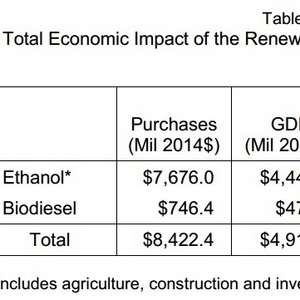IRFA: Renewable fuels community 'Ready to Roll' in 2015

ABF Economics
January 28, 2015
BY Iowa Renewable Fuels Association
Iowa Renewable Fuels Association Executive Director Monte Shaw said that Iowa’s renewable fuels industry is “ready to roll” in 2015 at the 9th Annual Iowa Renewable Fuels Summit. While lower feedstock prices powered the industry during 2014, a strong and growing federal renewable fuel standard (RFS) is needed to break the petroleum monopoly and increase consumer access to higher levels of cleaner-burning biofuels, like E15 and B20. In addition, IRFA released the results of a new Iowa economic impact study to highlight the importance of fighting for renewable fuels.
“Today, we are at a crossroads. I believe that never in the last decade has the renewable fuels industry been better poised for rapid growth,” Shaw said. “Today, I can say with absolute confidence that Iowa’s renewable fuels industry is ready to roll. We’ve never been in a better position for the availability and diversity of feedstocks; the industry is coming off a profitable year; new markets are being developed; and new technologies are out of the lab and producing on a commercial scale. There is simply no question that this industry is ready to roll. The question is whether the President and Congress are going to allow the renewable fuels industry to ‘hit it,’ or leave us stuck in neutral.”
Shaw warned the summit crowd, “We do not and should not sit back and wonder what D.C. will do. The oil lobby is out in full force. We must keep the pressure on President Obama to stand by the campaign promises he made to Iowans in 2008 and 2012. We must continually encourage our united federal delegation to fight the good fight for renewables in D.C. And we can look to the future. The race for the 2016 Iowa caucuses has already started and renewable fuels will be engaged in that process like never before.”
At the summit, the IRFA also released a study conducted by ABF Economics economist John Urbanchuk highlighting the impact of the renewable fuels industry on Iowa’s economy.
Advertisement
Advertisement
“2014 was a record-breaking year for the renewable fuels industry despite significant challenges and Iowa participated in the growth,” stated Urbanchuk. “Ethanol and biodiesel producers are part of a manufacturing sector that adds substantial value to agricultural commodities produced in Iowa. The first and second-generation feedstocks used to produce renewable fuels are produced primarily by Iowa farmers, and the R&D expenditures for renewable fuels provide important support for Iowa’s universities. Combined, these activities make a significant contribution to the Iowa economy.”
Based on the size and scope year-end, the renewable fuels industry had the following impacts on Iowa’s economy in 2014:
- Accounts for more than $4.9 billion, or about 3.5 percent, of Iowa GDP
- Generates $2.5 billion of income for Iowa households
- Supports more than 46,700 jobs throughout the entire economy.
Advertisement
Advertisement
To view the full report, please click here.
To view a fact sheet on the report, please click here.
To view Shaw’s prepared remarks, please click here.
Related Stories
U.S. fuel ethanol capacity fell slightly in April, while biodiesel and renewable diesel capacity held steady, according to data released by the U.S. EIA on June 30. Feedstock consumption was down when compared to the previous month.
XCF Global Inc. on July 8 provided a production update on its flagship New Rise Reno facility, underscoring that the plant has successfully produced SAF, renewable diesel, and renewable naphtha during its initial ramp-up.
The U.S. EPA on July 8 hosted virtual public hearing to gather input on the agency’s recently released proposed rule to set 2026 and 2027 RFS RVOs. Members of the biofuel industry were among those to offer testimony during the event.
The U.S. exported 31,160.5 metric tons of biodiesel and biodiesel blends of B30 and greater in May, according to data released by the USDA Foreign Agricultural Service on July 3. Biodiesel imports were 2,226.2 metric tons for the month.
The USDA’s Risk Management Agency is implementing multiple changes to the Camelina pilot insurance program for the 2026 and succeeding crop years. The changes will expand coverage options and provide greater flexibility for producers.
Upcoming Events










